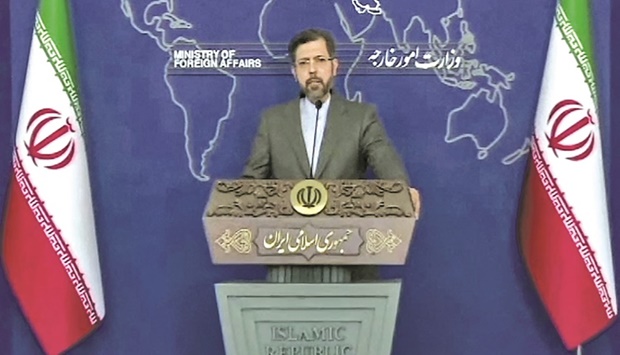Iran condemned as “not fair” yesterday a report by the UN nuclear watchdog on traces of nuclear material found at three undeclared sites.
The comments came with talks deadlocked since March on reviving a 2015 nuclear agreement between Tehran and world powers.
“Unfortunately, this report does not reflect the reality of the negotiations between Iran and the IAEA,” Foreign Ministry spokesman Saeed Khatibzadeh told reporters, referring to the Monday report by the International Atomic Energy Agency.
“It’s not a fair and balanced report,” he said, adding: “We expect this path to be corrected.”
In the report, the watchdog said it still had questions which were “not clarified” regarding nuclear material previously found at three sites — Marivan, Varamin and Turquzabad — which had not been declared by Iran as having hosted nuclear activities. It said its long-running efforts to get Iranian officials to explain the presence of nuclear material had failed to provide answers to its questions.
Iran and the IAEA agreed in March on an approach for resolving the issue of the sites, one of the remaining obstacles to reviving the 2015 deal. IAEA chief Rafael Grossi is due to “report his conclusions” to the watchdog’s board of governors at a meeting scheduled for next week. Formally known as the Joint Comprehensive Plan of Action, the 2015 deal gave Iran relief from crippling economic sanctions in exchange for curbs on its nuclear activities.
The parties to the pact with Iran saw it as the best way to stop it from building a nuclear bomb —a goal Tehran has always denied.
Then-US president Donald Trump unilaterally pulled out of the pact in 2018 and reimposed biting sanctions, prompting Iran to begin rolling back on its own commitments.
While most of the activities discussed in the IAEA report are thought to date back to the early 2000s, sources say that one of the sites, in the Turquzabad district of Tehran, may have been used for storing uranium as recently as 2018.
Iran saw an Israeli hand in the IAEA’s latest findings. “It is feared that the political pressure exerted by the Zionist regime and some other actors has caused the normal path of the agency’s reports to change from technical to political,” Khatibzadeh said.

An image grab from a video released by state-run Iran Press news agency yesterday shows Foreign Ministry spokesman Saeed Khatibzadeh briefing reporters in Tehran.
